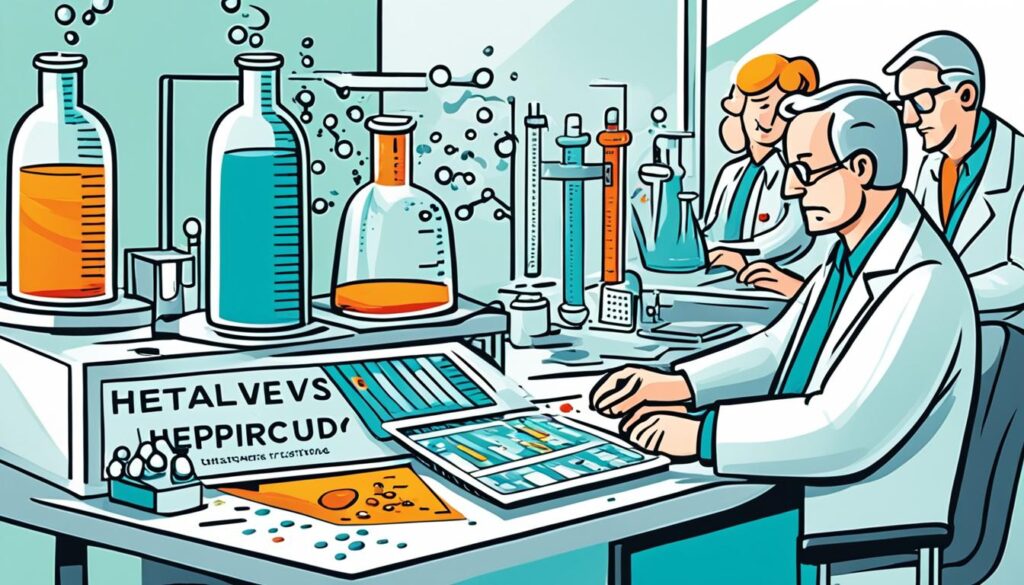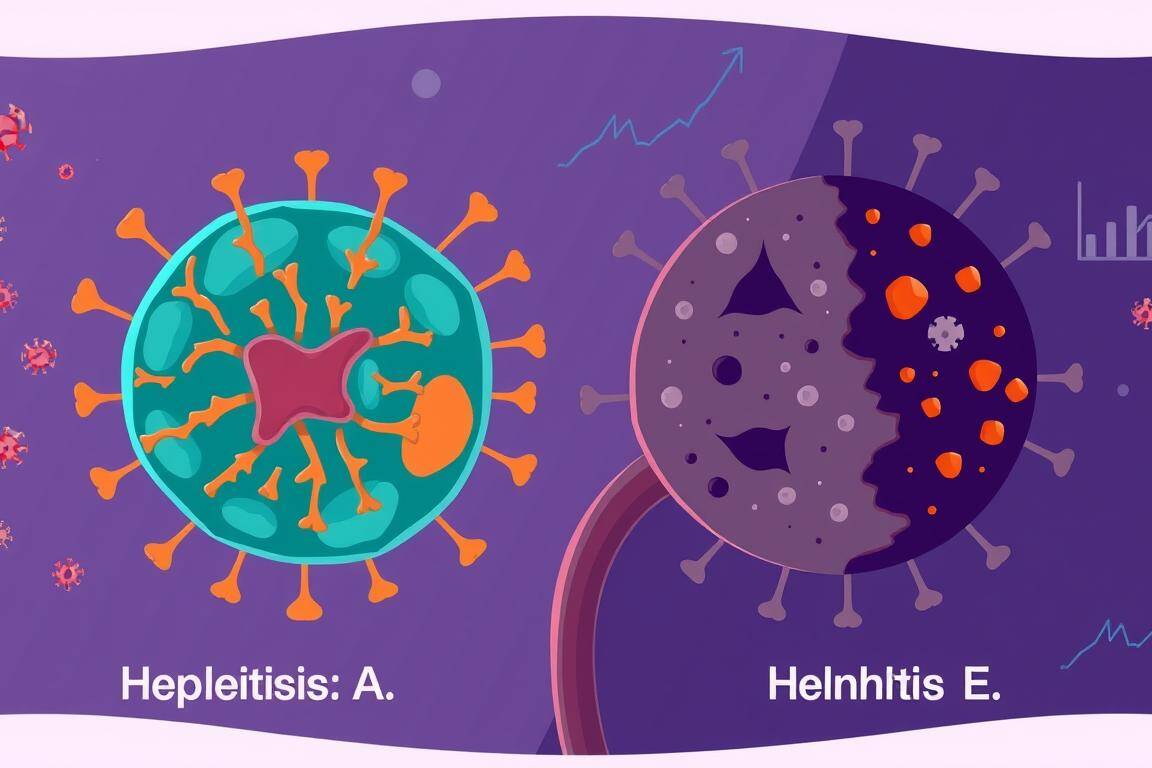Living with hepatitis C antibodies can feel overwhelming, but you can take charge of your health. Hepatitis C is a serious virus that affects the liver. Thanks to new treatments, many people can fully recover. This guide will cover everything you need to know about hepatitis C antibodies.
Table of Contents
ToggleIf you’ve just been diagnosed or have been living with hepatitis C for a while, this article is for you. We’ll cover the basics of the condition, treatment options, and how to manage your health. You’ll learn about the importance of a positive test result and how to support your mental health. Let’s start your journey to a healthier, happier life.
Understanding Hepatitis C Antibodies
Hepatitis C antibodies are proteins made by your immune system when it fights the hepatitis C virus (HCV). If you test positive for these antibodies, it means you’ve been exposed to the virus. But it doesn’t mean you’re currently infected. You’ll need more tests to see if you have a chronic infection that needs treatment.
What Are Hepatitis C Antibodies?
Hepatitis C antibodies are proteins your body makes to fight the hepatitis C virus. When you get infected with HCV, your immune system creates these antibodies. They help your body recognize and fight the virus. Even if the infection has gone away, these antibodies can still be found in your blood.
Significance of Positive Hepatitis C Antibody Test
- A positive hepatitis C antibody test means you’ve been exposed to the hepatitis C virus at some point in your life.
- But a positive test doesn’t mean you have a current infection. You’ll need more tests to see if the infection is chronic or has cleared.
- If you test positive for hepatitis C antibodies, your healthcare provider will likely order more tests. These tests check for an active infection and help decide what to do next.
Knowing what a positive hepatitis C antibody test means is key for getting the right treatment. It’s important to work closely with your healthcare provider to understand the results and what to do next.

Diagnosis and Testing
Diagnosing hepatitis C is easy and involves two steps. First, a screening test looks for hepatitis C antibodies. If the test finds these antibodies, a second test checks if the virus is causing an ongoing infection.
Initial Screening Tests
The first test for hepatitis C is the anti-HCV test. This blood test looks for antibodies against the virus. A positive result means you’ve been exposed, but it doesn’t mean you’re still infected.
Confirmatory Tests
After a positive antibody test, you’ll need a hepatitis C RNA test. This test checks for the virus in your blood. It also shows how much virus you have, helping doctors decide on treatment.
Doctors might also order liver function tests and imaging studies. These help check your liver’s health and any damage from the virus.

Getting tested for hepatitis C is key to managing your health. Knowing your status helps you take steps to monitor your condition, get the right treatment, and prevent spreading the virus.
Hepatitis C Antibody and Chronic Infection
If you’ve tested positive for hepatitis C antibodies, it’s important to know what comes next. About 70-85% of people with these antibodies will get a chronic HCV infection. This can cause serious liver damage, like cirrhosis and liver cancer, if not treated.
Getting diagnosed early and starting treatment is key to stopping chronic hepatitis C from getting worse. Regular check-ups and care can help manage the condition. This reduces the risk of long-term liver damage.
Understanding Chronic Hepatitis C
Chronic hepatitis C is a long-term liver infection from the hepatitis C virus. It can slowly get worse over time. This can lead to:
- Liver cirrhosis: Scar tissue forms, which can hurt liver function.
- Liver cancer: Chronic hepatitis C raises the risk of liver cancer.
- Liver failure: In bad cases, the liver stops working right.
Monitoring and Preventing Progression
Regular visits to your doctor are key for chronic hepatitis C. They can watch how the disease is doing and suggest treatments to stop or slow liver damage. Catching it early is crucial for keeping your liver healthy and lowering the risk of serious problems.
| Condition | Description | Potential Outcomes |
|---|---|---|
| Chronic Hepatitis C | Persistent liver infection caused by the hepatitis C virus |
|

With the right medical care and treatment, chronic hepatitis C can be managed. This helps keep your liver healthy and improves your overall well-being.
Treatment Options for Hepatitis C Antibodies
If you’ve tested positive for hepatitis C antibodies, there are now effective treatments available. These treatments can help manage the condition and even cure it. The main treatment is direct-acting antiviral (DAA) medications. These are oral, interferon-free treatments that can cure most people with chronic hepatitis C in 8-12 weeks.
Direct-Acting Antiviral Medications
DAA medications target specific proteins in the hepatitis C virus. This stops it from replicating and spreading. These treatments have changed how we treat hepatitis C. They offer higher hepatitis c cure rates, fewer side effects, and shorter treatment times than older treatments.
Treatment Duration and Success Rates
The treatment plan and length will depend on your hepatitis C genotype, liver cirrhosis, and how you respond to the medication. Often, direct-acting antivirals can cure hepatitis C in 8-12 weeks. Success rates are usually over 90%.
Working closely with your healthcare provider is key to finding the right hepatitis C treatment for you. With the right treatment, you can manage your hepatitis C antibodies and improve your health and well-being.
Living with Hepatitis C Antibodies
Living with hepatitis C can be tough, but you can stay healthy and live better with the right steps. Making lifestyle changes is key to managing hepatitis C. These changes help keep you well.
Lifestyle Changes
When you have hepatitis C, it’s important to avoid alcohol. It can harm your liver more. Eating well and staying active are also crucial. A balanced diet and regular exercise help your liver and overall health.
Managing Side Effects
People with hepatitis C may face side effects from their treatment. Working with your doctor is key to handling these side effects. They might change your medicine, try new treatments, or suggest self-care tips to ease symptoms.
Being proactive with hepatitis C can improve your health and life. Regular check-ups, talking with your healthcare team, and focusing on hepatitis C self-care are important. They can really help you on your journey.
For more info on living with hepatitis C, check out resources from trusted health groups.
Preventing Transmission of Hepatitis C Antibodies
Hepatitis C spreads mainly through infected blood, often from sharing needles or during unsafe medical procedures. To stop its spread, it’s key to use safe practices and make smart choices.
Harm Reduction Strategies
If you use intravenous drugs, don’t share needles, syringes, or any other equipment. Join a needle exchange program for clean supplies and safe disposal to lower hepatitis c transmission risk.
Safer Medical Practices
Always make sure medical staff use clean, one-time-use equipment. If you’re worried about a medical procedure’s safety, ask about their infection control steps to prevent hepatitis c.
Blood Exposure Precautions
Stay away from situations where you might touch infected blood, like giving first aid or cleaning spills. If you do get exposed, wash the area well with soap and water right away to reduce the risk of hepatitis c transmission.
| Preventive Measure | Description |
|---|---|
| Needle Exchange Programs | Provide sterile injection equipment and safe disposal options to reduce the spread of hepatitis C through drug use. |
| Safe Medical Procedures | Ensure healthcare providers use sterile, single-use equipment and follow proper infection control protocols. |
| Blood Exposure Precautions | Avoid contact with infected blood and properly clean any exposure to reduce the risk of hepatitis C transmission. |
Using these hepatitis c prevention steps, you can help stop the spread of hepatitis C. This protects you and others too.
Support Resources for Hepatitis C Antibody Patients
Living with hepatitis C can be tough on your mind and heart. But, you don’t have to go through it by yourself. There are many support options out there, from local and online groups to professional help for your mental health.
Local and Online Support Groups
Meeting others who know what you’re facing can really help. Look for local hepatitis C support groups in your area. These groups let you share stories, get advice, and make friends who understand you. You can also find online forums and groups to connect with more people who have hepatitis C antibodies.
The American Liver Foundation has many resources. They offer support groups and programs to help you deal with your hepatitis C diagnosis and meet others who are going through the same thing.
Mental Health Support
Don’t overlook the emotional and mental effects of living with hepatitis C. Getting help from mental health professionals, like counselors or therapists, can really help. They can ease your stress, anxiety, and depression. Many healthcare providers and groups also have special mental health services for people with hepatitis C antibodies.
You’re not alone in this fight. By using the support options available, you can take care of your mental health. You can build a strong support network and face the challenges of living with hepatitis C antibodies.
Hepatitis C Antibody Screening and Public Health
Screening for hepatitis C is key to lowering the disease’s impact and boosting public health. The Centers for Disease Control and Prevention (CDC) suggest all adults in the U.S. get tested for hepatitis C. Many people with the virus don’t know they have it. This step is vital for fighting hepatitis C as a public health issue.
More people getting tested and treated can stop the virus from spreading. When people with hepatitis C antibodies get the right care, they can manage their condition better. This helps not just them, but also everyone around them, by lowering hepatitis C rates.
Studies show that focused hepatitis C screening can really make a difference in public health. By testing high-risk groups and testing widely, health experts can better understand and tackle hepatitis C. This comprehensive approach is key to winning the battle against this disease.
FAQ
What are hepatitis C antibodies?
Hepatitis C antibodies are proteins made by the body to fight the hepatitis C virus (HCV). If someone tests positive for these antibodies, it means they’ve been exposed to the virus. But it doesn’t mean they’re currently infected.
What does a positive hepatitis C antibody test mean?
A positive test means you’ve been exposed to hepatitis C. But it doesn’t mean you’re infected now. You’ll need more tests to see if you have a chronic infection that needs treatment.
How is hepatitis C diagnosed?
Diagnosing hepatitis C is a two-step process. First, a test looks for hepatitis C antibodies. If those are positive, a second test checks for the virus itself and if it’s chronic.
What is the significance of chronic hepatitis C?
About 70-85% of people with hepatitis C antibodies get a chronic infection. This can cause serious liver problems like cirrhosis and liver cancer if not treated. Catching it early and treating it is key to preventing these issues.
What are the treatment options for hepatitis C?
There are effective treatments for hepatitis C now, like direct-acting antiviral (DAA) medications. These oral treatments can cure most people with chronic hepatitis C in 8-12 weeks. The treatment plan depends on the HCV type, cirrhosis, and how well you respond to the meds.
How can individuals with hepatitis C antibodies manage their condition?
Managing hepatitis C can be tough, but there are steps to help. Making healthy lifestyle choices, avoiding alcohol, eating well, and exercising regularly are key. It’s also important to manage any side effects from treatment.
How is hepatitis C transmitted?
Hepatitis C spreads mainly through infected blood, often from sharing needles or during unsafe medical procedures. To prevent it, use clean needles, sterile equipment, and avoid risky behaviors.
What support resources are available for individuals with hepatitis C antibodies?
Local and online support groups offer great resources and a community for those with hepatitis C. Mental health support, like counseling, can also help with the emotional and psychological effects of the disease.
Why is widespread hepatitis C screening important?
Screening for hepatitis C and linking people to care is key to fighting the disease. The CDC recommends screening all adults in the U.S. because many don’t know they’re infected. More screening and treatment can stop hepatitis C from spreading and eliminate it as a health threat.
Source Links
About The Author

Medically reviewed by Dr. Nivedita Pandey, MD, DM (Gastroenterology)
Senior Gastroenterologist & Hepatologist
Dr. Nivedita Pandey is a U.S.-trained gastroenterologist and hepatologist with extensive experience in diagnosing and treating liver diseases and gastrointestinal disorders. She specializes in liver enzyme abnormalities, fatty liver disease, hepatitis, cirrhosis, and digestive health.
All content is reviewed for medical accuracy and aligned with current clinical guidelines.
About Author | Instagram | Linkedin





